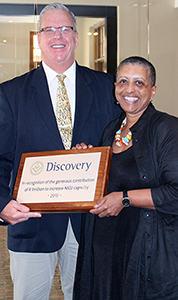Latest News Archive
Please select Category, Year, and then Month to display items
18 September 2018
Photo Hanno Otto
 The OSM Camerata is once again a winner, sharing the first prize in the Ictus International Music Competition with the Oklahoma State University.
The OSM Camerata is once again a winner, sharing the first prize in the Ictus International Music Competition with the Oklahoma State University.
If Einstein’s string theory had a musical undertone, one would think it is because of the sweet melodies of the Odeion School of Music Cameratas’ (OSMC) violins and cellos. It should therefore come as no surprise that OSMC won the 2018 International Ictus Music Competition, again. The ensemble has been paving the way to numerous successes since its inception in 2012.
This year, however, the OSMC is sharing the first prize with the Oklahoma State University Symphony Orchestra, under the direction of Dr Thomas Dickey. The OSMC’s competition recital for 2018 was conducted by principle conductor, Xavier Cloete. Acclaimed violist Elsabé Raath, joined the OSMC artistic team in 2017 as string clinician.
OSMC the jewel in crown
The OSMC is based at the Odeion School of Music (OSM) at the University of the Free State UFS) and was strategically founded as the OSM’s flagship ensemble with the main objective, creating a catalyst for excellence. “From a pedagogical perspective, it serves as a feasible incubator to nurture fully-rounded musicians who are thoroughly prepared for the demands of their trade as orchestral musicians, soloists and conductors,” said Marius Coetzee founder of the OSMC.
“Ms Raath also made her debut as conductor during the 2018 Ictus Music Competition where she conducted O Sacrum Convivium by Olivier Messiaen,” said Coetzee, founder of the OSMC. Elsabé was also conductor during the 2018 Ictus Music competition.
The OSMC’s concert programme for Ictus 2018 also consisted of works by Jacobus Gallus/Lance Phillip, Béla Bartók, Peteris Vasks/Keith Moss, as well as Johann Sebastian Bach.
Ictus an ideal platform
The Ictus International Music Competition is an online music competition for wind bands, orchestras and solo trumpet. It has been described by David Bilger of the Philadelphia Orchestra as “democratising music competitions”. Ictus was founded to make international music competitions more accessible though eliminating prohibitive travel costs, conference fees and visa issues. This was made possible through having the application and adjudication take place online only.
You can listen to OMSC Ictus submissions here:
Duo Seraphim Jabobus Gallus/Lance Phillip
Romanian Folk Dances/ Román népi táncok Béla Bartók
Kekatu Dziesma (Carnival Song) Peteris Vasks/Keith Moss
Neonatal Care Unit receives donation to expand capacity
2015-10-28
 With the best care and technology available,
the survival rate of premature
babies is about 85%. The neonatal intensive
care unit at the Universitas hospital can now
expand its capacity thanks to a donation of
R1 million by the Discovery fund.
From the left is Prof André Venter.
Head: Department of Paediatrics and
Child Health at the UFS, and mrs Ruth Lewin,
Head: Corporate Sustainability at Discovery.
|
The smallest people need the greatest care. This care is being provided by the neonatal unit in the Children’s Wing of the Universitas Hospital. This project of the University of the Free State (UFS), under the leadership of Prof Andre Venter, has led to several miracles regarding child health since its inception.
Now, thanks to a donation of R1 million rand from the Discovery fund, this unit can expand its capacity and treat more premature babies.
About 14% of babies in South Africa are born before the 37th week of pregnancy. These babies are born with a very low birth weight, and are in need of critical care. The neonatal intensive-care unit at Universitas Hospital is currently equipped to take care of about 14 premature babies at a time, from birth to discharge. However, because of the high incidence of premature births in the hospital’s service area, the unit needs about 45 beds.
The aim of the Children’s Wing Project is to expand the neonatal intensive-care unit in order to meet the demands of the hospital’s service area, which reaches as far as the Southern Cape. The Discovery Fund recently donated R1 million to the project, which will be used to expand the capacity of the neonatal intensive-care unit.
“With the best care and technology available, the survival rate of premature babies is about 85%. Without this, half of all premature babies would die,” says Prof Venter, Head: Department of Paediatrics and Child Health at the UFS.
“This is the reason why private and public partnerships, such as the one with Discovery, are essential to make specialised services available to the most vulnerable people. Discovery has made a significant contribution to the project without which we would not have been able to expand the capacity of the unit